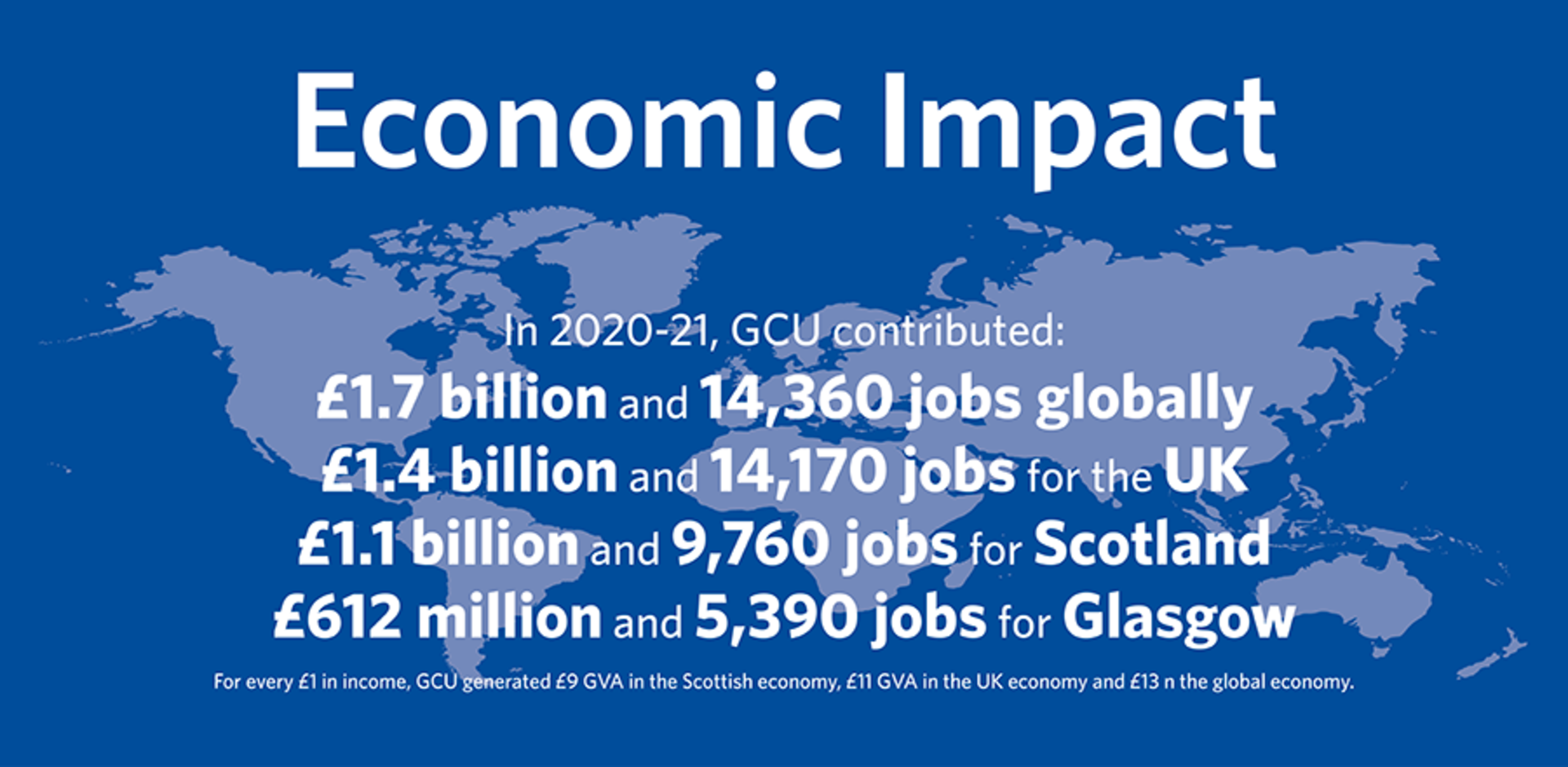GCU generates huge benefits for Scotland

An independent report on the economic and social impact of Glasgow Caledonian University (GCU) has concluded the University contributes more than £1.4 billion to the Scottish economy and is a “valuable asset to the City of Glasgow”, bringing economic and employment opportunities, and “working to address the deep-rooted economic, social and health inequalities in the City”.
The report, undertaken by economics consulting firm BiGGAR Economics, also highlights major benefits to the UK and globally, and notes GCU “lives its mission to be the University for the Common Good”. It shows that in the academic year 2020-21, GCU generated:
- £1.7 billion and 14,360 jobs globally
- £1.4 billion and 14,170 jobs in the UK
- £1.1 billion and 9,760 jobs in Scotland
- £612 million and 5,390 jobs in Glasgow.
BiGGAR Economics, which has undertaken economic impact studies of more than 200 universities across Europe, suggests that beyond its economic footprint GCU also drives powerful and multi-layered social impact. This includes building social capacity through a long-standing commitment to widening access that “bring opportunities to children and young people who live in the most disadvantaged areas of Glasgow”.
GCU also creates strategic value in areas including “health and wellbeing, poverty and inequalities, sustainable businesses and environments, industry, innovation and infrastructure”.
In terms of its direct benefits to the City, the report states: “The economic, social and health inequalities which are present in the population and economy of Glasgow have, in many ways, shaped the offering at GCU and it has built its courses, access programmes, wider outreach work and business engagement activity to address these needs.”
The report also highlights that the University’s “specialist research centres and units inform and advise government departments and organisations on policies which are aimed at improving society, the economy and public services at a national and international level”.
The report notes GCU has an ethos to improve the lives of its students and people in wider society and is focused on employment-ready graduates and ensuring relevant skills in a changing landscape. It states, GCU’s “Common Good Award Scheme and its values around social innovation, sustainable environments and business practices, employment skills, gender equalities and international development have a positive influence on its graduates and, in turn, the wider society and businesses they contribute to.”
With a Top 70 ranking in the Times Higher Education Global Impact Rankings 2021, the report notes that GCU’s focus on the UN Sustainable Development Goals is helping to reduce inequalities and support a sustainable economic future at a national and international level.
A like-for-like comparison, undertaken by BiGGAR Economics in 2013-14, shows GCU’s quantifiable impact has grown by 17%, due primarily to the growth of its core activities, its graduate impact and its health and social care impacts.
Principal and Vice-Chancellor of Glasgow Caledonian University, Professor Pamela Gillies CBE said: “We are delighted that this independent analysis finds that Glasgow Caledonian University authentically lives its values and mission as the University for the Common Good. In doing so, the University contributes very significantly in a sustainable way to the economic and social health and wellbeing of the communities it serves in the City of Glasgow, across Scotland and around the world.
“We will continue to challenge the traditional perceptions of how a University can work with others to have a lasting impact on society.”
Academic year 2020-21, on which the findings are based, saw the launch of the University’s ambitious Strategy 2030 which sets a clear vision for GCU as a world leading University for social innovation, committed to its mission For the Common Good. Building on the foundations of Strategy 2030, we will seek to further enhance our economic contribution and social impact in local and global contexts.
